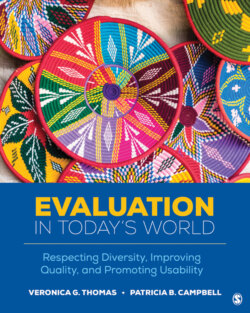Читать книгу Evaluation in Today’s World - Veronica G. Thomas - Страница 94
На сайте Литреса книга снята с продажи.
The Evaluators’ Ethical Guiding Principles
ОглавлениеThe AEA’s Evaluators’ Ethical Guiding Principles (referred to as the Guiding Principles for Evaluators until 2018) were first adopted in 1994 and have subsequently undergone multiple revisions. They are intended to proactively guide and inspire the ethical conduct of evaluators at all stages of the evaluation process. These guidelines build, implicitly and explicitly, upon the three principles (respect for people, beneficence, and justice) in the Belmont Report. The Evaluators’ Ethical Guiding Principles stress that it is the primary responsibility of the evaluator to initiate discussion and clarification of ethical matters with relevant parties to the evaluation. (See Appendix A for a full presentation of the Evaluators’ Ethical Guiding Principles.)
There are five major Evaluators’ Ethical Guiding Principles. Each of these ethical principles is accompanied by several directives or subprinciples to amplify the meaning of the overarching five principles and to provide guidance for their application. The five guiding principles, briefly described as follows, do not imply priority among them, but instead, priority will vary by situation and evaluator role.
Systematic inquiry: Evaluators conduct data-based inquires that are thorough, methodical, and contextually relevant. This principle focuses most directly on methodological decisions made during the evaluation, although it renders no judgments favoring some methodologies over others. There are six subprinciples under systematic inquiry.
Competence: Evaluators provide skilled professional services to stakeholders. The principle of competence focuses on issues of the evaluator’s education, experience, relevant expertise, cultural competence, and professional development. This guiding principle includes four subprinciples.
Integrity: Evaluators behave with honesty and transparency in order to ensure the integrity of the evaluation. Here, evaluators must cultivate openness and full disclosure with stakeholders throughout the entire evaluation process. There are seven subprinciples under integrity.
Respect for people: Evaluators honor the dignity, well-being, and self-worth of individuals and acknowledge the influence of culture within and across groups. At all times, evaluators must demonstrate respect in terms of their interactions with stakeholders (regarding ethnicity, class, gender, orientation, etc.), including not judging them; not discrediting them; ensuring that their views are faithfully recorded, as appropriate; and giving them due consideration in the evaluation process. This guiding principle includes four subprinciples related to the overarching respect for people principle.
Common good and equity: Evaluators strive to contribute to the common good and advancement of an equitable and just society. Prior to the August 2018 Evaluators’ Ethical Guiding Principles revision, this principle was labeled “responsibilities for general and public welfare.” Because the revised principle places more explicit focus on common good and equity, it was renamed as such. There are five subprinciples under common good and equity.
The five Evaluators’ Ethical Guiding Principles are not independent, but instead, they overlap in many ways. For example, being honest and transparent (integrity principle) overlaps with honoring the dignity, well-being, and worth of individuals (respect for people principle). Conversely, sometimes these principles will conflict, and so evaluators will have to choose among them. When this occurs, evaluators must use their own values and knowledge of the evaluation context to determine the appropriate course of action. The following case study involves the external evaluation of a health program and was developed in 2006–2007 by the AEA Ethics Committee Professional Development Task Force. The first author, Veronica Thomas, was a member of that task force, and this case has been used as part of a training package on the Evaluators’ Ethical Guiding Principles.
